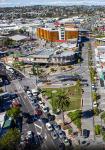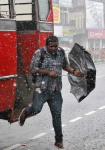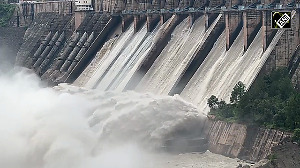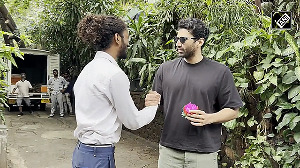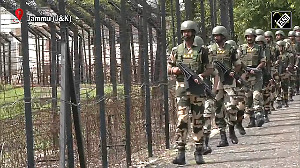'Dr Kalam never felt or behaved like a President during his entire tenure of five years as President.'
'Not even a single day, he felt he was the first citizen of India, or someone different from the others, or the President of India.'

President Ram Nath Kovind's term in office ends next month, and a new President will be elected on July 18, 2022.
As the suspense over the next President continues, Rediff.com's Shobha Warrier spoke to S M Khan, the distinguished bureaucrat who served as the press secretary of the one and only 'People's President', about his recollections of the A P J Abdul Kalam Presidency.
Khan -- author of The People's President, Dr A P J Abdul Kalam -- is currently vice president of the India Islamic Cultural Centre and director and dean, Jamia Hamdard University, New Delhi.
The first of a two-part interview:
You were the principal information officer for the CBI for many years.
You were the director general of Doordarshan News.
You were also President Kalam's press secretary.
Would you say this assignment was special in your career?
Definitely. Working with Dr Kalam was one of the most memorable assignments in my 34 years of service.
I can never forget the day I first met him; it was on the 5th of August 2002. He had become the President on the 25th of July.
Whatever I have learnt from President Kalam will remain with me forever.
In fact, I have written a book also on my days with him.
I have described those days as the most unforgettable, momentous and the best tenure in my career.
Was it because working with Dr Kalam was a unique experience that you decided to write a book?
Yes, working with Dr Kalam was such a unique experience that after his passing away, I decided that I should share my experience with the others.
Another reason was, I happened to meet Prime Minister Modi during the Independence Day celebrations at Rashtrapati Bhavan soon after Dr Kalam passed away on the 27th of July 2015. That was the first Independence Day after his passing away.
As I conveyed my greetings to Prime Minister Modi, he said 'Kalam Saheb par kuch likhiye'.
His words were very inspiring, and I thought my best tribute to Dr Kalam would be to write a book on him.
Later I presented the first copy of the book to the prime minister as well.

We had Textbook Presidents, we had Rubber Stamp Presidents, but Dr Kalam was the only person who was called the People's President. What kind of a person was he?
Dr Kalam never felt or behaved like a President during his entire tenure of five years as the President.
Not even a single day, he felt he was the first citizen of India, or someone different from the others, or the President of India.
Dr Kalam always used to say, 'I am just an ordinary person'.
When I first met him, he told me, 'I want to make this a people's place and not a Presidential palace. So, you also work with that in mind'.
He interacted with people in such a way that people felt he was one among them.
The most charming part of his personality was, he made whoever he met feel, whether he be the President of a country or an ordinary person of India or any other country, he was one of them.
He liked to have direct interactions with people without any paraphernalia, without anybody else getting involved.
Also, on the first day itself, he made it clear that everybody would call him Dr Kalam and not His Excellency.
In fact, there was a standing instruction to all the officers with the Government of India and state governments that they would only address him as Dr Kalam.
There is a practice that wherever the President goes, a limousine will go before him, and Dr Kalam was totally against it.
'What a sheer wastage of money and people! Why should a fleet of cars be flown from Delhi to Chennai or Pune or Patna for my visit?' he exclaimed.
He asked them to stop the practice immediately. He said, 'I will use the vehicle provided by the state government.'
In those days, Ambassador cars were used by all the government offices and Dr Kalam would happily travel in those Ambassador cars.
Another practice he stopped was having separate chairs for the President on the dais whenever he addressed a function.
He insisted on having the same chairs as the others, and not the ornate ones kept for the President.
His argument was, 'Why should I sit on a different chair when all the others use same kind of chairs?'
Another thing I will never forget was this. It has been a long standing practice at Rashtrapati Bhavan that every year when the flowers bloom in the Mughal Gardens, it will be open for the general public in February and March.
During his time, thousands of people would visit the garden. He would go there unannounced and talk to the visitors, asking them, from where they came, which flowers they liked, whether they liked walking around, etc.

He was never worried about security...?
Never. He would meet and talk to people even on New Year's Day, Independence Day, Republic Day, etc.
On festival days like Christmas, Eid and Diwali, he would keep the gates of Rashtrapati Bhavan open throughout the day, and anybody could go in without any pass.
All of them could meet him personally and talk to them.
This was how he conducted himself as the President of the country.

Was everyone working at Rashtrapati Bhavan surprised initially to see a President behaving like an ordinary person?
Yes, the entire staff was surprised. The security forces used tell him about the Blue Book.
He would then tell them, 'You just treat me as Dr A P J Abdul Kalam and not as the President of India. This is not a Presidential palace to have a Blue Book; this is just the headquarters of the President of India in a democratic republic who is answerable to the people of India! We are not living in a monarchy'.
As you know all the protocols of Rashtrapati Bhavan came into existence during British times when the Viceroy was answerable to the British monarchy.
It was never changed. He always used to say, 'Change to what is suitable for a democratic country'.
Part 2: 'He was not there to earn money, position or power'
Feature Presentation: Aslam Hunani/Rediff.com






